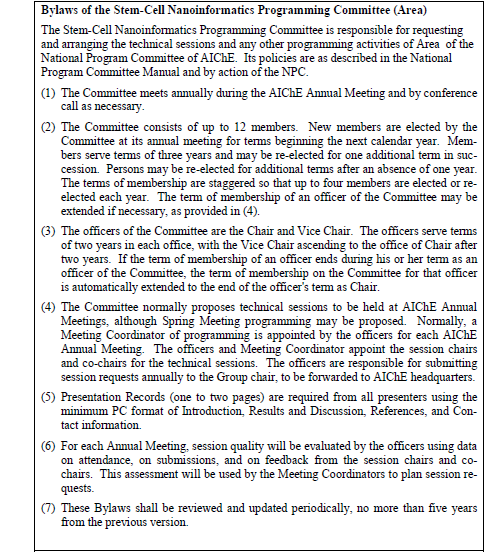A2.1 General programming procedures and guidelines
The purpose of these guidelines is to provide guidance to entities of the Institute in their service of providing technical programming.
General subject areas for programming are represented by Programming Groups and their sub-Areas that make up the AIChE Program Committee. These organizations develop technical programming on their focus subjects. Formal co-sponsorship allows Groups or Areas with shared interests to develop and advertise programming more effectively.
Most often, contributed papers are presented in oral presentations, poster, or demonstration sessions.
The Annual Meeting is held in the Fall, typically in October/November. Features of the Annual Meeting include the Annual Business Meeting, the Institute Lecture, Andreas Acrivos Professional Progress in Chemical Engineering Award Lecture, Arther D. Little Corporate Innovation Award Lecture, Topical Conferences and the many technical sessions sponsored by the programming groups of the PC.
The Spring Meeting is held typically in March/April. It is also constituted of Topical Conferences and technical sessions sponsored by the programming groups of the PC. Co-sponsored events, such as symposia, topical conferences, with other societies and organizations are encouraged.
Other meetings may be held at various times as arranged by the PC and Headquarters staff.
Guidelines for programming at Annual and Spring Meetings are described below. Specific guidelines for Topical Conferences are presented as Appendix A4.
A2.2 The AIChE Programming Retreat
A planning retreat with members of the PC, EBPC, future MPC's, AIChE staff, CTOC, RANTC and invited guests is held each year to plan the upcoming meetings and to discuss programming issues and strategies for the Institute. This is a key planning tool of the PC. The plans for this meeting are the responsibility of the person who will be EBPC Chair at the retreat, and he or she will need to initiate planning of the retreat while in the office of 1st Vice Chair. For example, the 1st vice chair in 2014 will be responsible for initiating planning at the end of 2014 for the 2015 AIChE Programming Retreat.
The Retreat is held on the Saturday before the Spring Meeting begins.
The purposes of the AIChE Programming Retreat include:
- To review pre-existing sessions and topical conferences for the Spring and Annual Meetings;
- To create new sessions and topical conferences on emerging subject areas of importance to the Institute's members.
- To align the Institute's Programming entities (Divisions, Forums, etc.) with strategic planning, including information from AIChE departments on marketing, logistics, and planning;
- To train programming entities' representatives on the programming organization and work process;
- To promote networking of programming representatives;
- To plan special events and meetings;
- To assess quality performance of the previous year's Spring and Annual meetings, including providing overall and session attendance data;
- To develop new initiatives to better serve the Institute's stakeholders
A2.3 Guidelines for programming committee structures
The purpose of this section is to provide guidelines for structures of the individual program committees within the AIChE Program Committee. These entities are represented by Groups, which in some cases have subordinate Areas. Many of these programming entities correspond to AIChE Divisions or Forums, but some are stand-alone organizations. Their responsibilities are to develop, conduct, and evaluate programming on relevant topics using sufficient structure as to represent the AIChE membership effectively.
The specific programming entities are published annually in the AIChE Activities Directory under “Committees: Programming Areas.” They are listed above in these appendices and on AIChE’s website.
Bylaws for programming committees
Any programming group or area that submits programming requests to AIChE should have a set of operating rules or bylaws for its respective programming areas, approved by the EBPC.
The bylaws are intended to provide an orderly procedure for the programming areas to involve the membership of the Institute in programming decisions and to provide for continuity as well as for periodic changes in leadership. This balance is meant to promote vitality within the programming groups and to provide opportunities for participation by all interested members of the Institute.
The bylaws for each programming Group and Area should include a statement of purpose, a description of how programming decisions are made, and the mechanism and schedule for selection of committee members and officers. Each overall programming Group should have current written procedures addressing all its sub-Areas. These procedures should be updated periodically.
For new programming Groups and, where appropriate, Areas and at the time of updating, these procedures should concisely provide:
a. Description of the organization;
b. Recognition of how the overall programming entity aligns with the PC and the policies stated in the AIChE Programming Manual;
c. Specific requirements for the assignment of programming responsibilities for each sub-Area of programming to an individual or sub-committee, including lines of reporting;
d. Specific requirements for personnel succession (length of term, appointment, procedures, etc.); these specifications shall ensure sufficiently frequent turnover of the leadership, along with terms long enough to provide continuity;
e. Description of key programming work processes that adequately addresses (i) participation in the annual Retreat, (ii) coordination with MPC's, other meeting chairs, and National Headquarters, and (iii) the delivery of all programming products such as electronic abstracts, proceedings, program copy, etc.;
f. Recognition and acceptance of key AIChE requirements for the preparation and submittal of written papers and abstracts in compliance with specific meeting deadlines;
g. Descriptions of how data from various tools are used in preparation of their programming requests (e.g., market analysis, focus groups, session evaluation data). Procedures should include any specific additional practices and requirements used by the entity to fulfill their programming responsibilities (e.g., peer review, submittal of presentation copies);
h. Description of how programming quality is evaluated.
Example: Bylaws for an Area

Special requests and questions should be discussed with the AIChE Program Development Director unless a clear line of communication has been previously established.
| <<Previous Page | Next Page>> |
- Log in to post comments
